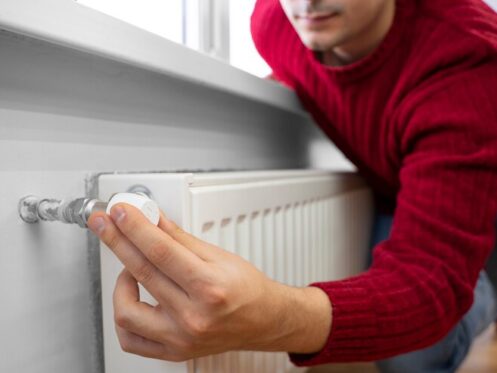As a homeowner in Wichita, KS, and the surrounding areas, ensuring the comfort and warmth of your living space is essential, especially during the colder months. When it comes to heating your home, selecting the right size for your heating system is a crucial decision. Installing a heating system, whether a furnace, air-source heat pump, or geothermal heat pump, that is either too small or too large for your space can lead to various problems, from inadequate heating and decreased energy efficiency to unnecessary wear and tear on the equipment.
We’ll discuss the importance of properly sizing your home’s heating system, how it affects energy efficiency and comfort, and why consulting with our professional technicians at Midwest Mechanical is essential for making the best choice.
1. Consequences of an Improperly Sized Heating System
When a heating system is not accurately sized for your home, it can lead to several problems that adversely affect the system’s efficiency, your home’s comfort, and the operational costs.
a) Oversized Heating System: An oversized heating system can cause frequent and rapid cycling, which means the system will turn on and off more frequently than necessary. This erratic cycling can result in the system prematurely wearing down, increased energy consumption, and higher utility bills. Moreover, an oversized heating system struggles to maintain consistent temperatures throughout your home, leading to hot and cold spots that can negatively impact your overall comfort.
b) Undersized Heating System: On the other hand, an undersized heating system will struggle to provide the necessary heat output to maintain a comfortable temperature in your home during colder months. The system will need to work longer and harder to reach the desired temperature, which can lead to overworking the system, decreased energy efficiency, and shorter equipment lifespan.
2. Factors Affecting Heating System Sizing
Determining the properly sized heating system for your home requires taking into account several factors, including your home’s layout, insulation levels, and window types. Here are the key considerations when sizing a heating system:
a) Square Footage: The size of your home is a primary factor in determining the capacity required for your heating system. Generally, larger homes require larger heating systems, while smaller homes can be served by smaller systems.
b) Insulation Levels: Your home’s insulation quality significantly influences the heat required to maintain a comfortable temperature. A well-insulated home retains heat better, requiring a smaller heating system compared to a poorly insulated home of the same size.
c) Windows: The number, size, and quality of windows in your home impact heat transfer between the indoors and outdoors. High-quality, energy-efficient windows can help minimize heat loss and maintain a comfortable indoor environment, affecting the proper sizing of your heating system.
d) Floor Plan: The layout of your home, including the location of walls, doors, and ceilings, can influence air circulation and heat distribution, affecting the required size of your heating system.
3. Professional Load Calculations: Getting the Right Size for Your Home
Finding the optimal heating system size for your home is not as simple as relying on square footage alone. Our professional technicians can perform a detailed load calculation using industry-standard methods such as the Manual J calculation – a process that considers numerous factors about your home to determine the proper size of the heating system accurately.
Load calculations take into account your home’s construction materials, insulation levels, air leakage, window types, number of occupants, and even the direction your home faces to estimate the heating output required for your living space. By collaborating with our experts, you can be confident that your desired heating system is accurately sized for your unique home needs.
4. Heating System Options: Finding the Right Solution for Your Home
Once you have determined the appropriate size for your heating system, you can explore the various options available to find the best solution for your home. Some popular heating system options include furnaces, heat pumps, and geothermal heat pumps.
a) Furnaces: Furnaces are one of the most common heating system types, offering efficient heating capacities and relatively straightforward installation. They are available in a variety of fuel types, including natural gas, oil, and electricity.
b) Air Source Heat Pumps: Heat pumps provide both heating and cooling capacities and are known for their high energy efficiency. They transfer heat between the air indoors and outdoors using refrigeration principles, offering an environmentally friendly option for many homeowners.
c) Geothermal Heat Pumps: Geothermal heat pumps work similarly to traditional heat pumps but use the ground’s stable temperature for heat transfer. These highly efficient systems can provide significant energy savings, albeit with higher installation costs than traditional heat pumps or furnaces.
Conclusion: Achieving Maximum Efficiency and Comfort with Properly Sized Heating Systems
Understanding the importance of properly sizing your heating system is crucial for achieving optimal energy efficiency, reduced utility bills, and maximum comfort in your home. By considering factors such as insulation levels, windows, and floor plans and seeking professional assistance for load calculations, you can ensure the best heating solution for your unique needs.
Our team of skilled technicians at Midwest Mechanical is committed to helping you make an informed decision on the right-sized heating system for your home. We can assist with expert load calculations, installation, and maintenance to keep your home comfortable and efficient throughout the colder months. Contact us today to discuss your heating needs and discover the perfect heating solution tailored to your home.
